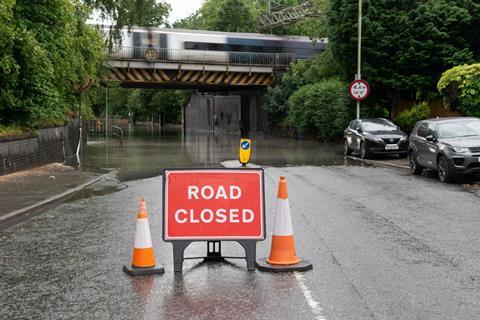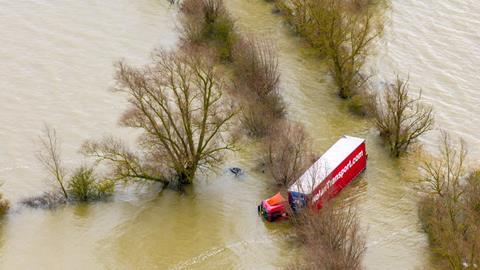More companies in transport and storage were affected by flooding in the last year than any other sector and yet only a fraction have assessed the risks of climate change to their business, according to new figures.
The office for national statistics said 17.8% of companies in the sector, including couriers, home delivery and logistics firms, suffered weather-related damage to their physical infrastructure; 9% were impacted by storms and 8.7% by flooding.
However, just 3.4% have a climate change strategy in place.
Parcelhero said a higher proportion of companies in transport and storage had been hit by flooding events than any other comparable sector, but spiralling costs prevented firms from addressing the risks with business owners burying their heads in the – presumably soggy - sand.
David Jinks, Parcelhero head of consumer research, said: “Last winter was the eighth wettest since records began more than 150 years ago.
“Then in March, England and Wales had more than one and a half times their average rainfall. Since then, the last few months have been marked by severe rainstorms.
“The poor weather has had a profound impact on transport and storage sector businesses. An alarming 10.2% reported that severe weather events had caused disruption to their local supply chains and 8.7% reported disruption to their global supply chains.
“These weather events also caused employee absences for 9.7% of transport and storage firms. Despite these grim figures, only 3.6% of companies said they had assessed their climate change risks of increased flooding and 7.7% had assessed their risks of supply chain disruption.”
Jinks added: “Asked for the reasons businesses were prevented from taking action against climate change effects, 25.5% of transport and storage companies blamed costs. That was the highest number of any business sector.
“A huge 68.7% of transport and storage sector companies also revealed they had taken no action at all to protect the environment.”

However, Parcelhero said the report was not all doom and gloom, with 11% of hauliers saying they had taken action to adapt to increased flooding, almost 21% had mitigated against supply chain disruption and 12.3% against temperature increases.
“Additionally, 7.7% of transport and storage firms have a net zero or greenhouse gas emissions target,” Jinks said.
“That’s higher than any other comparable sector, including retail, manufacturing and construction.
“Most impressive of all, asked what actions, if any, businesses had taken to reduce their carbon emissions, 12.6% of transport and storage companies reported electrifying their vehicle fleet. That was the highest amount of any sector and reflects the major focus many distribution, courier and logistics companies have on reducing vehicle emissions.”














